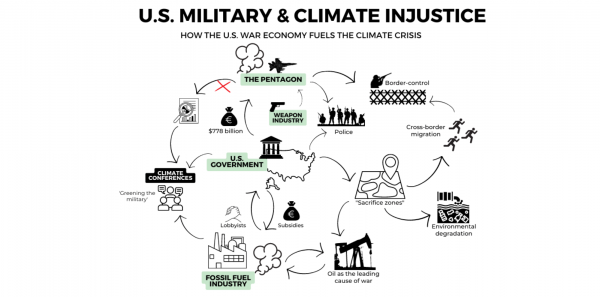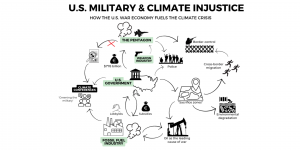It was finally time to come together with my 'learning pod' ( what our professor, the great Avi Lewis called a group) to decide on a topic for our 'teach-in', the biggest assignment for the course. What I particularly enjoyed about this course was the emphasis placed on learning from our community. Every week, for a portion of the semester, about 4 groups would present on topics from within the environmental movement but with a climate justice perspective.
The topic that we chose was militarism. This was inspired by a paper that I wrote for a previous course, and thankfully, my teammates were just as thrilled to place it as a basis for the presentation. Of course, this 'teach-in' wasn't a replication of the paper, but it was a reimagination of it.
We knew we wanted to focus on the topic of militarism especially because it was underrepresented in climate movements. This was an opportunity to educate our peers and instructors. We were a group of 4. We did a great job splitting such a big topic (hence loads of research!) into digestible categories for our audience. I was handled with the case study of Iraq, which I felt I was best fit to speak to, as I have a personal connection to the Middle East.
We also needed to make our presentation collaborative and work with the knowledge levels that existed amongst our audience. Hence, we had a brainstorming session with the audience. In addition, there's always something about emission numbers/quantities that feels ungraspable. I will forever have issues with understanding what all these numbers mean. So, we made an effort to explain the destructive effects of the US military (emissions wise) using examples from everyday life. For example, for every one hour a jet is in operation, it emits what a fuel powered car does in SEVEN years. Also, we developed this extremely intricate visual to draw connections between militarism and other themes we've covered in class ( see attached image, very proud of it).
My tasks included tons of research, especially on the effects of the US military on the health of Iraqis. I looked at a lot of studies that examined the overwhelming proliferation of cancer rates and congenital anomalies (birth defects) amongst communities that resided near military bases. It was quite the heavy topic to deal with. I also worked hard to present all this information in a way that is understandable yet honest/ true to the despicable/unjust conditions that Iraqis were/are put under.
The presentation happened eventually, and we scored the highest in class! Our teacher's assistant kindly mentioned that our presentation was worthy of being presented in a conference. That is the feedback of a lifetime. 

- Working with teammates that came into this topic with very fresh eyes was a very rewarding experience for me. Even though it was quite the learning curve for most of them, witnessing their perspective and how they've come to make their own connections provided me with new angles.
- I think this topic is one that matters immensely. I understand the importance of taking up space in academia to discuss matters that don't directly affect us in Canada, where we are sheltered from military violence
- I learned so much from all the topics that other groups presented on, and I solemnly believe that loads of people learned from ours.